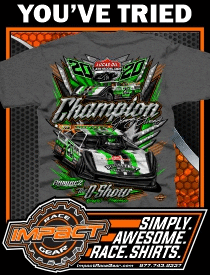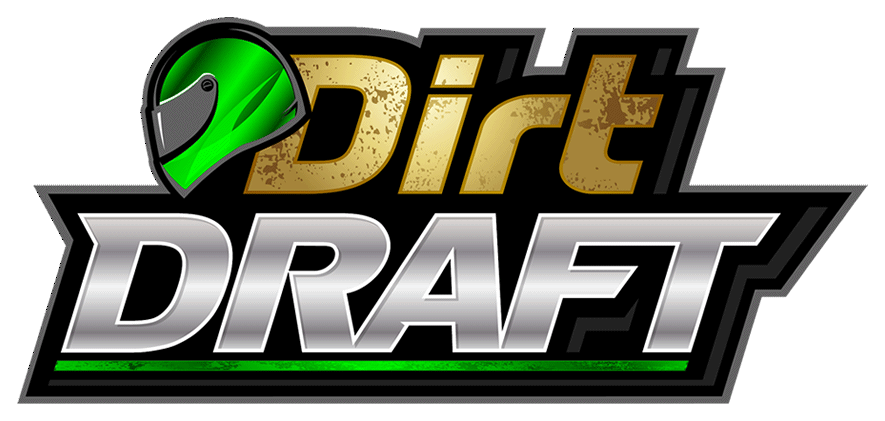
Mental health agenda helps drive Crate racer
By Jim Zufall
Special to DirtonDirt.com“I went through a series of depression where I wanted to kill myself about 10 years ago … ”
That’s not exactly the way a profile of your average short-track racer normally starts out. But Lon Emerick isn’t your average short-track racer.
For Emerick, driver of the No. 3 Stamp Out Stigma and Recovery is Possible RUSH Crate Late Model in the Sweeney Chevrolet Series, racing isn’t just a lifelong dream — it’s a lifelong dream that just might help save a life someday.
“I grew up in the central part of (Pennsylvania), around DuBois,” said Emerick, who competes regularly at Sharon Speedway in Hartford, Ohio. “So I grew up watching Late Models.”
Emerick had a dream to race Late Models and was sure he would someday, but, when he moved to Transfer, Pa. (near Greenville), the tracks running Late Models weren’t exactly close by.
“They weren’t in this part of the state when I came out here so that’s how I got to working on Sprints and Modifieds,” Emerick said.
After a number of years of working on the big-block modifieds of Pennsylvanians Guy Griffin and Andy Paden, Emerick decided it was time to go Late Model racing.
“When they started making their presence out here in the crates, I was like, ’I gotta do this or I’m never going to do it,’” Emerick said of his Late Model aspirations. “Kind of one of those deals where I wake up 70 years old and say, ’I wish I would have.’”
So off Emerick went into the world of Late Model racing at age 39 with no help, no crew and no real knowledge of the cars.
“I just bought a Late Model because I always liked them growing up,” Emerick said. “I didn’t know a thing about them, but I thought, You know everything else has come pretty easy, I’ll catch on to this too.” It’s been a world of difference!“
Even though the learning curve on the Late Model car was a rather steep one for Emerick, he credits Guy Griffin for a lot of his knowledge.
”He taught me a lot about how to run a race team,“ Emerick said of Griffin. ”How to do weekly maintenance, how to have a schedule and stick to all that stuff. The things I learned from him, I use now.“
But that doesn’t mean Late Model racing has come easy to Emerick.
”It’s now just trying to figure out these cars — they’re so different from anything I’ve ever touched,“ Emerick said. ”I don’t work with anybody. I do this all by myself in the garage, I pull it to the track myself, unload it myself and drive it. Trying to learn how to drive it and set it up and do all this stuff all by yourself with very little help has been a real challenge.“
Emerick has found that with time, the help has started to come. And in keeping with the normal narrative of racing, it has come from within his own competitors.
”Will Thomas and the Ruffos have been real nice,“ Emerick said. ”Steve Burns and Randy Snider have helped me out a ton by helping me make bodies. Matt and Tim Latta of Latta Brothers Racing have been very helpful to me as well — Matt drove my car at a test last summer to try and help me get a better set up in it, and his brother and crew chief Tim rebuilt my transmission for me this year.“
So for a guy who grew up watching Super Late Models in central Pennsylvania, what drew him to the crate-engine Late Model and specifically the RUSH Series?
”I wanted to race Late Models and I’m a school teacher so I’m not going to go race Super Lates,“ Emerick said. ”I don’t have $30,000 for an engine and another $10-$12,000 for a car and the trailer and all the stuff that goes with it. This seemed like an affordable way to go fast and race a car that I wanted to race because you don’t have to have a ton of money to win. I still believe that I have what I need to win if I had a little more smarts and a little more practice.“
Emerick’s story may well have a happy ending in his racing career as time and experience pile up, but for him, life certainly didn’t have a happy beginning. In reference to the first line of this story, Lonnie Emerick was in a serious crisis related to his severe depression, one of the most prevalent mental health issues in this country. In fact, perhaps more important to Emerick than picking up that first checkered flag is raising awareness to a disease that affects the lives of millions in this country.
Truth is, he dedicates his racing career to it.
”The Stamp out Stigma program started with Value Behavioral Health,“ Emerick said. ”It’s a program to get people to realize to try to remove the stigma from mental illness.“
Emerick knows from personal experience how life can change, not only for the person suffering from a mental health condition but those around that person.
”If people find out you’re being treated for mental health issues, whether it’s bi-Polar or depression or schizophrenia or any of that stuff, what do people automatically think?“ he asked. ”You’re violent, you’re nuts — you know these are all stigmas attached to that. So for that reason people don’t go get help, and they don’t tell people that they’re having problems.“
This is where the sponsors that adorn Emerick’s car come into play. Organizations such as Value Behavioral Health, Community Counseling Center, United Way of Mercer County, Sharon Regional Health System, UPMC Horizon and The Primary Health Network work in the mental health field not only to treat those who suffer from the disease but to get those who need help to the proper mental health care program.
”The fact that it’s a sickness that can be treated like a cold is sad,“ says Emerick of those that don’t step out and seek help. ”The reason that it’s near and dear to my heart is that I went through a serious depression where I wanted to kill myself about 10 years ago.“
For Emerick, knowing that there is help drives him to bring awareness to others who need help but have yet to seek it.
”Being on the other side of it now, I remember it, feeling so bad about yourself that you deserve every worse thing you can think of,“ Emerick said. ”You don’t even deserve to breathe. It’s a terrible place that I would wish on no one to be.“
So with his mental health issues under control but knowing that there are so many others out there that need help and either won’t get it, or simply don’t know where to turn, Emerick is trying to turn his experiences into ways to help others suffering the same things he did. He chose to use his race car and his racing as the vehicle — pun intended — to get the message out that there is help.
”I guess I started thinking, I have this platform to use — the racing thing,“ said Emerick. ”Whether you do well or not, people that know you think it’s cool that you’re racing. Your name gets around even if you’re not very good. So I thought, instead of using this platform to advertise beer distributors or pizza shops, I thought I would use it to help somebody get through something.’
“I remember going to races, sitting there, half watching the race, half feeling bad about things, wondering if I’m going to go home tonight or ...”
Emerick’s voice trails off thinking about what might have been when he was in the situation dealing with the depression.
Emerick goes on to talk about how what he is doing might have a positive impact on someone else in the same struggle: “If there’s one or two people sitting at the races every week that are feeling like that, maybe they’ll see this, maybe they’ll get help. Believe it or not in the last two years since I’ve been doing this, I’ve been approached by people who heard about this program and saw my car. They will ask me about my own story or how can they get help or what should they do. It’s that kind of stuff that makes me more strong about it.”
Part of the stigma that Emerick tries to deal with is helping folks who need the help but simply won’t come out of their own shadows seek help. When he is approached by someone looking for some help or direction, it is not while they are in a crowd of their peers. In fact, they are nearly always alone.
“No one has ever talked to me about it when there’s other people around,” Emerick said. “And the couple people that have, it’s been in private. Like, they will be kind of hanging around, keeping an eye on me waiting to get done with whatever I’m doing and then they will approach me when I’m not engaged with someone and we’ll talk. I know how they feel ’cause I’ve lived it.”
In the end, Emerick’s goal is to simply bring people suffering as he was to come out of that dark place, shed the stigma that unfortunately is associated with mental illness and understand that it’s not only okay, but imperative to seek help.
“The more people realize that you’re not violent, you’re not crazy, you’re not broken, that it’s OK to get help — and it works,” he said.
That awareness and understanding of the problems he has dealt with is what drives him to continue this mission: “That’s the goal of it all. To get people to realize that it’s okay, there’s help available, and it works. You can get better.”
Emerick has had a life experience that not everyone will understand. But beyond the depression, beyond the illness and his awakening to the fact that there is help for him and others like him, there was another aspect of his experience that we everyone learn from — that is, the way that we as humans tend to retract from each other when another of us has an issue that is seen as mysterious or even thought of as dangerous. This reaction from Emerick’s friends complicated an already bad situation, but, like the rest of his life, he has figured out how to deal.
Because this is such a sensitive subject and he handles it in such a unique way with a Dirt Late Model race car, Emerick himself offered this final conclusion: “One of the biggest things for me to deal with besides the depression itself was how many people I thought were ’friends’ that distanced themselves or completely abandoned me in my hour of need while I was going through this. That hurt me greatly at the time. But through my work with my counselor I realized that people like that were never friends anyway. There were only a handful of people that stuck around and offered me a helping hand. They are still friends of mine today.
”I tell people when they ask, I don’t have a lot of friends, I have ’acquaintances.’ I feel like a lot of people don’t realize how few of their ’friends’ will actually stick around and get their hands dirty to help them out when the chips are down and it’s not easy to be there anymore. The ones who do are the true friends and they should be valued. Having depression isn’t like being in a bad mood for a week and it’s OK again you know? Mine lasted for years and I wasn’t easy to be around. I don’t think anyone I race with knows this about me either so I’m a little nervous about what they will think, but in the end it’s about helping another person avoid going through something similar to what I did, not what anyone else thinks about me.
“I’m happy and comfortable with myself so anything negative that others might think due to their own personal beliefs or stigma won’t bother me a bit. The feeling of helping someone reclaim their happiness is much greater than any other so I’m going to keep on doing it and spreading the word through racing as long as I’m fortunate enough to be able to. And when that’s over I’ll find another way. Honestly though, I’d like to do it through racing for many more years as I can. I can’t think of a more fun way to do it!”
Heading into the season finale, Emerick sits a respectable sixth in the RUSH Late Model standings at Sharon. And while he may never raise a checkered flag or hold a championship trophy, to those that his efforts have helped or will help, he is already a champion.

















































